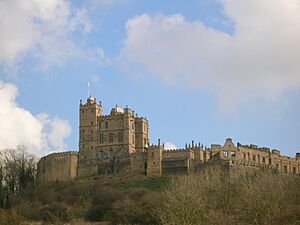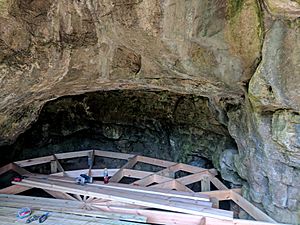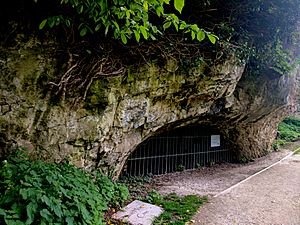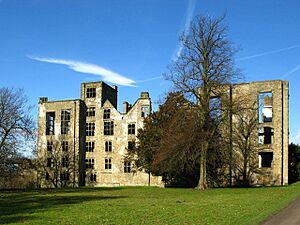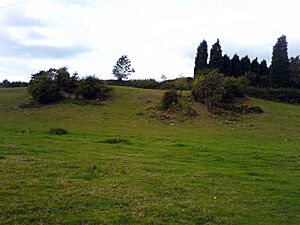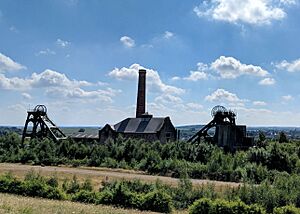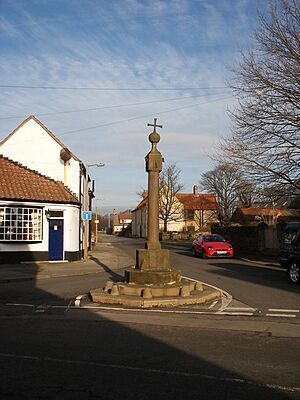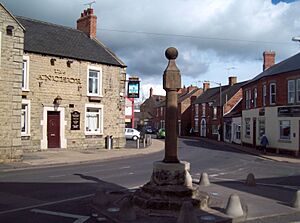Scheduled monuments in Bolsover facts for kids
This article is about the amazing scheduled monuments found in the Bolsover area of Derbyshire, England. These are special historical places or buildings that are protected by law because they are very important to the history of the United Kingdom.
Contents
What Are Scheduled Monuments?
In the UK, a scheduled monument is a really important archaeological site or old building. It gets special protection to stop it from being changed without permission. These sites are put on a list, or "schedule," by the government. English Heritage is a group that helps find and protect these places.
There are about 20,000 scheduled monuments on this list! Sometimes, more than one historical spot can be part of a single entry on the list. While a scheduled monument can also be a listed building, English Heritage often prefers listed building status for protecting buildings.
Derbyshire has over 500 scheduled monuments. These include ancient stone piles called cairns, stone circles, old burial mounds called barrows, and even relics from lead mining. There are also ancient settlements and more than 20 old bridges.
Amazing Monuments in Bolsover
The Bolsover district is home to many fascinating scheduled monuments. Let's explore some of the most interesting ones!
Bolsover Castle
Bolsover Castle is a fantastic castle located in Old Bolsover. It's not just a scheduled monument, but also a Grade I listed building, meaning it's super important! The castle you see today was built in the early 1600s. It stands on the remains of a much older castle from the 1100s, which itself was built on an even older castle mound from the 1000s. Sir Charles Cavendish started building the current castle between 1612 and 1617.
Creswell Crags: Ancient Caves
Creswell Crags is an amazing place with a limestone gorge (a deep valley with steep sides). It's right on the border between Derbyshire and Nottinghamshire. The cliffs here have several caves that were used by people during the last ice age, from about 43,000 to 10,000 years ago. These caves are super special because they contain the northernmost cave art found in Europe!
Some of the famous caves here include Pinhole Cave, Mother Grundy's Parlour, Robin Hood's Cave, Boat House Cave, and Church Hole Cave. Digs in these caves have found tools and signs of ancient life.
Hardwick Old Hall
Hardwick Old Hall is a grand old house from the Elizabethan era (the time of Queen Elizabeth I). Today, it's mostly impressive ruins. The Old Hall was built between 1587 and 1597 by a very famous lady named Bess of Hardwick. She later moved to the brand new Hardwick New Hall, which is only 200 meters away! Like Bolsover Castle, Hardwick Old Hall is also a Grade I listed building.
Langwith Cave
Langwith Cave is a round chamber about 6 meters wide, with several passages leading into it. When people dug here between 1903 and 1927, they found some incredible things! They discovered remains from the Neolithic period, including a human burial and a child's skull. They also found older Palaeolithic items like flint tools, reindeer bones, woolly rhinoceros bones, and even old fireplaces.
Pleasley Colliery
Pleasley Colliery is a former coal mine that started operating in the 1870s and produced coal until 1983. It's a rare and important site because it has the only surviving setup in the UK with two steam engines in the same engine house, between two mine shafts. The engine house, chimney, and headstocks (the tall structures above the mine shafts) are also protected as a Grade II listed building.
Ash Tree Cave
Ash Tree Cave is another important cave located near Whitwell. Since 1934, excavations here have found amazing artifacts from many different time periods. These include items from the Palaeolithic, Mesolithic, Neolithic, Bronze Age, Iron Age, and even Roman times!
Standing Crosses
You can also find historic standing crosses in the Bolsover district, like the one in Barlborough and another in Clowne. These crosses are often very old and were important landmarks in medieval times. The Barlborough cross is also a Grade II* listed building.
 | Sharif Bey |
 | Hale Woodruff |
 | Richmond Barthé |
 | Purvis Young |


